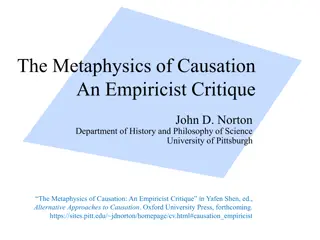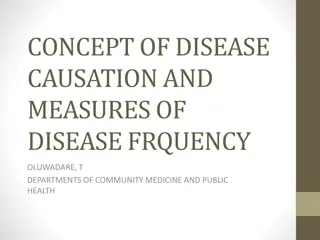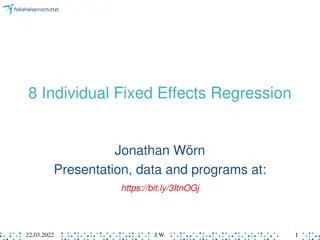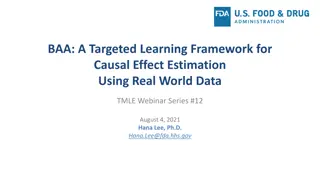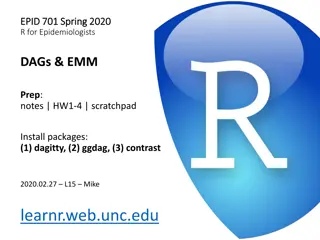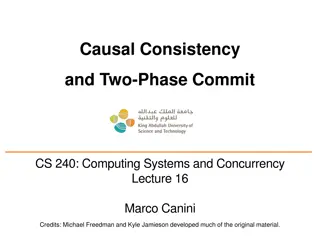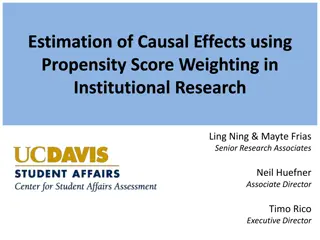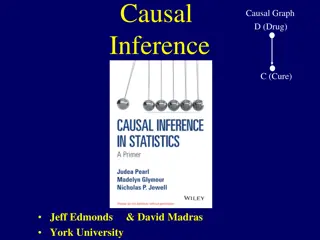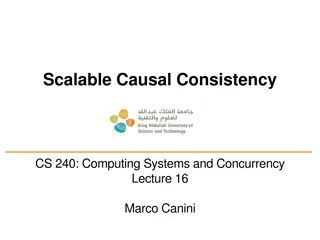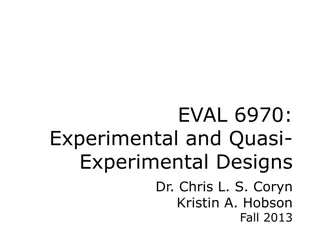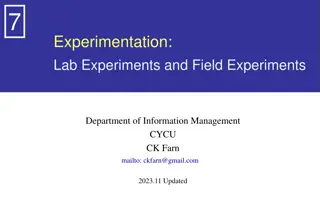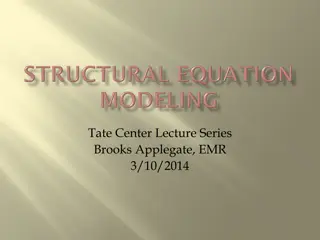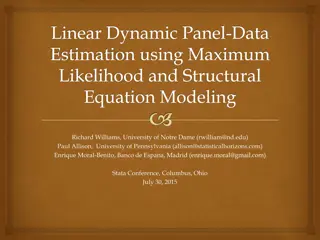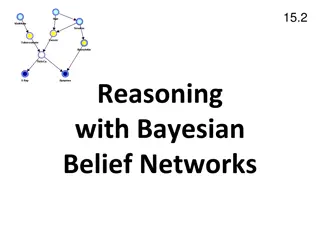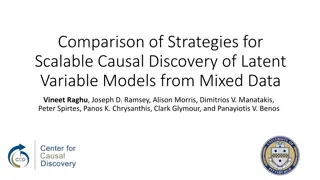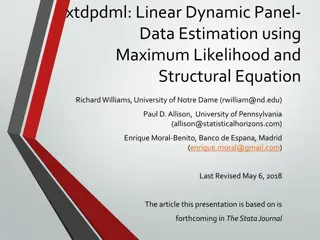Critique of Causal Metaphysics and Empiricism
In this content, the author critiques the metaphysics of causation from an empiricist perspective, exploring the limitations of empiricism in understanding the contingent truths of the world. It discusses causal antifundamentalism, various forms of skepticism, including Humean skepticism, and challe
5 views • 55 slides
Disease Causation and Frequency Measures
The concept of disease causation delves into the factors that play a role in the development of diseases, emphasizing the importance of studying causation for prevention, control, and treatment. To infer causation, certain conditions must be met, and a causal relationship is characterized by associa
3 views • 47 slides
Fixed Effects Regression for Causal Inference in Social Research
Explore the concept of fixed effects regression for obtaining causal estimates with observational data, focusing on the association between social participation and depressive symptoms. Discover how this method controls for time-invariant factors and eliminates confounding variables, providing a clo
2 views • 49 slides
Targeted Learning Framework for Causal Effect Estimation Using Real World Data
Hana Lee, Ph.D., presents a webinar on the Targeted Learning Framework for Causal Effect Estimation using Real World Data (TMLE). The project aims to help the FDA develop a structured approach to incorporating real-world data into regulatory decision-making. TMLE offers a systematic roadmap aligned
1 views • 27 slides
Directed Acyclic Graphs (DAGs) for Causal Inference
Directed Acyclic Graphs (DAGs) play a crucial role in documenting causal assumptions and guiding variable selection in epidemiological models. They inform us about causal relationships between variables and help answer complex questions related to causality. DAGs must meet specific requirements like
1 views • 63 slides
Causal Consistency in Distributed Systems
This content covers the concept of causal consistency in computing systems, exploring consistency models such as Causal Linearizability and Eventual Sequential. It explains the importance of logical clocks like Lamport and vector clocks, and how they ensure order in distributed systems. The concept
1 views • 35 slides
Estimation of Causal Effects using Propensity Score Weighting
Understanding causal effects through methods like propensity score weighting is crucial in institutional research. This approach helps in estimating the impact of various interventions, such as a writing program, by distinguishing causation from correlation. The use of propensity score matching aids
3 views • 22 slides
Causal Inference and Causal Graphs in Drug Efficacy Studies
This content delves into the concept of causal inference using causal graphs, specifically focusing on the relationship between a drug (D) and its effectiveness in curing a condition (C). It discusses the importance of distinguishing correlation from causation and explores scenarios where confoundin
1 views • 66 slides
Enhancements in Causal Forecasting: SPM 11.0.1/11.1 Overview
Key enhancements in SPM 11.0.1/11.1 focus on improving forecast accuracy through variable history slices, causal forecasting for multiple streams, multi-threading capabilities, easy access to product rollout and causal value pages, and more. The Next Gen Causal Forecasting introduces additional feat
0 views • 6 slides
Causal Consistency in Computing Systems
Explore the concept of Causal Consistency in Computing Systems, covering topics such as consistency hierarchy, Causal+ Consistency, relationships in causal consistency, practical examples, and its implementation within replication systems. Learn how it ensures partial ordering of operations and conv
15 views • 31 slides
Scalable Causal Consistency for Wide-Area Storage with COPS
This paper discusses the implementation of scalable causal consistency in wide-area storage systems using COPS. It delves into the key-value abstraction, wide-area storage capabilities, desired properties such as ALPS, scalability improvements, and the importance of consistency in operations. Variou
0 views • 42 slides
Experimental and Quasi-Experimental Designs
Explore the foundations of experimental and quasi-experimental designs, delving into causal relationships, counterfactual reasoning, and the importance of validating statistical and internal conclusions. Learn about causes, effects, and the complexity of determining causation in research. Discover R
8 views • 46 slides
Experimental Design and Validity Trade-offs in Research
Explore the concepts of experimental design, trade-offs in research validity, causal relationships, evidence, and controls in experiments. Delve into lab and field experiments, manipulation of variables, controls, and the importance of causal evidence in research. Consider the impact of extraneous f
4 views • 42 slides
Overview of DAGs in Causal Inference
Understanding Directed Acyclic Graphs (DAGs) in causal inference is crucial for guiding research questions and analyzing causal relationships. This overview covers the basics of DAGs, their requirements, and applications in analyzing causal assumptions. Dive into the world of DAGs to enhance your re
0 views • 28 slides
Latent Variable Modeling in Statistical Analysis
Latent Variable Modeling, including Factor Analysis and Path Analysis, plays a crucial role in statistical analysis to uncover hidden relationships and causal effects among observed variables. This method involves exploring covariances, partitioning variances, and estimating causal versus non-causal
3 views • 59 slides
Evolution of Universes in Causal Set Cosmology Analysis
Causal sets propose a discrete and dynamical spacetime structure, where spacetime elements, called spacetime atoms, evolve through stochastic dynamics. This growth process governs the passage of time, manifesting as accretion or birth of new elements. Classical Sequential Growth Models offer a frame
9 views • 17 slides
Causal Inference in Data Journalism
Delve into the world of data journalism as it explores the causal relationship between museum visits and longevity. Discover the theory of selection, randomized controlled trials, and the nuances of causal claims. Uncover the ambiguity in causal-associational relationships and the idealized RCT appr
2 views • 14 slides
Deriving Causal Inference from Nature
Uncover the nuances of causal relationships through experiments focusing on barnacles, substrate types, and potential outcomes. Explore the depth of mechanistic understanding and address confounding factors to refine your experimental design for robust causal inference.
3 views • 52 slides
Scalable Causal Consistency Using Dependency Matrices
This study explores Orbe, a system that achieves scalable causal consistency through dependency matrices and physical clocks. It discusses key-value data store APIs, partitioning strategies, data center structuring, geo-replication, consistency models, and the implementation of causal consistency in
3 views • 37 slides
Dynamic Causal Modelling
Peter Zeidman presents Dynamic Causal Modelling Advanced Topics at the Wellcome Trust Centre for Neuroimaging, University College London in October 2016. This course focuses on in-depth understanding and practical applications of dynamic causal modelling in functional magnetic resonance imaging (fMR
0 views • 34 slides
Recent Developments in Causal Inference and Regression Adjustment
Recent developments in machine learning for causal inference and regression adjustment are discussed by Alex Deng, Pavel Dmitriev, Somit Gupta, Ronny Kohavi, and Paul Raff. The focus is on beyond Average Treatment Effect, Effect Heterogeneity, Bayesian A/B Testing, and methods like controlled experi
3 views • 22 slides
Causal Studies in Statistics
This detailed course overview covers topics such as design and analysis of causal studies, office hours, reading materials, assessment breakdown, course website information, and key concepts like causality and the Rubin Causal Model. It delves into the formal framework for causal effects, study desi
4 views • 24 slides
Does Money Matter? Causal Effects of Income on Health in Developed Countries
New advances explore the causal effect of income on health outcomes in high-income countries, focusing on children's outcomes and adult health. Studies using natural experiments evaluate the impact of family income on various short and long-term outcomes in developed nations. Findings suggest that w
3 views • 14 slides
Dynamic Panel Data Estimation Methods for Causal Inferences
Learn about the challenges and methodologies of estimating dynamic panel data models using Maximum Likelihood and Structural Equation Modeling for making causal inferences. Discover the popular econometric methods like the Generalized Method of Moments (GMM) and insights on handling estimation probl
1 views • 30 slides
Bayesian Belief Networks: Understanding Causal Inference in AI
Dive into the world of Bayesian Belief Networks (BBNs) for reasoning with probabilities and causal relationships among variables. Developed by Judea Pearl in the 1980s, BBNs are essential for various AI applications such as diagnosis, expert systems, planning, and learning. Explore how BBNs encode c
0 views • 45 slides
Causal Inference in Big Data Research
Discover the importance of causal inference in performance debugging, health science, social sciences, and marketing. Explore the process of causal inference, its distinction from predictive analysis, and the goal of integrating it into relational databases for scalable analysis. Dive into specific
1 views • 14 slides
Causal Inference in Machine Learning
Explore the realm of causal reasoning and inference in machine learning, encompassing the discovery of causal relationships from data, heterogeneous treatment effects, automated causal inference, and more. Delve into the complexities of causal discovery and the effects of causes, shedding light on h
4 views • 22 slides
Causal Inference Research Areas and Projects Overview
Explore a comprehensive overview of research areas in causal inference, including unmeasured confounding, network analysis, psychometrics, transfer learning, and more. Delve into notable papers and projects, such as sensitivity analysis in genomic experiments and causal inference with latent variabl
4 views • 18 slides
Strategies for Scalable Causal Discovery of Latent Variable Models
Discover new strategies for causal inference on integrated datasets, comparing their benefits on simulated data and applying a high-performing strategy to real biomedical datasets. Explore Fast Causal Inference (FCI) algorithms for learning causal structures in the presence of confounding factors.
2 views • 40 slides
Dynamic Panel Data Estimation and Causal Relationships
Panel data, also known as longitudinal data, offers control for unobserved confounders and determining causal relationships. However, combining fixed effects with cross-lagged panel models presents estimation challenges. The generalized method of moments (GMM) is a popular econometric approach for e
4 views • 32 slides
Causal Studies and Randomized Experiments Overview
Explore the design and analysis of causal studies with randomized experiments led by Dr. Kari Lock Morgan and Dr. Fan Li at Duke University. Dive into covariates, assignment mechanisms, and creating balanced treatment groups for estimating causal effects. Understand classical randomized experiments
7 views • 24 slides
Causes and Applications of Causal Inference in Statistics
Explore the life and work of a renowned American statistician who revolutionized causal inference in social sciences, development economics, and field experiments. Learn about the critical approach to dealing with missing data and noncompliance, with a focus on transparent notation and real-world ex
1 views • 6 slides
When to Use Causal Language in Data Analysis
Explore the importance of using causal language in data analysis, including experiment scenarios and examples. Learn to differentiate between causal and non-causal language and understand the nuances behind determining causal relationships.
9 views • 46 slides
Impact of Children on Parents' Well-being Through Causal Effect Estimation
Explore the complexities of estimating the causal effect of children on parents' well-being using instrumental variable approaches. Delve into different research questions, methods, strengths, and weaknesses in this intriguing research domain. Learn about the challenges researchers face in handling
3 views • 24 slides
Understanding Causal Models in Disease Control and Prevention
Explore the concept of causal models in disease control and prevention, including the definition of cause, modern interpretations, and the component cause model. Learn how different factors interact to bring about disease outcomes and the role of causal components in disease etiology.
0 views • 17 slides
Proposed Two-Step Reachability Estimation for mmWave Networks
This document discusses the proposed two-step reachability estimation approach for mmWave networks, focusing on the benefits it provides and the structure of the estimation process. It emphasizes the importance of initial estimation in the sub-7GHz band followed by a finer estimation in the mmWave b
5 views • 23 slides
Bijective Causal Models: Identifiability & Theorems
Explore the counterfactual identifiability of bijective causal models, including the Backdoor Criterion, practical algorithms, and other theorems in causal modeling. Discover the implications and applications of bijective generation mechanisms in establishing causal relationships.
0 views • 11 slides
Understanding Causal Inference: Models, Estimation, and Prediction
Explore the world of causal models for counterfactual prediction and causal effect estimation. Unravel the complexities of causal inference with detailed insights and implementations in causallib. Learn about the crucial aspects of identification, estimation, and the difference between supervised le
0 views • 34 slides
Causal Discovery with Mixed Data Using Constraint-Based Methods
Explore the world of causal discovery with mixed data through constraint-based approaches, learning causal networks, and the PC Algorithm for Bayesian network learning. Discover the methods for identifying causal relationships and orienting edges in a Bayesian network to gain insights into complex d
1 views • 23 slides
Understanding Causal Systems of PTSD
Explore the Causal Systems Model of Post-Traumatic Stress Disorder (PTSD), which views mental disorders as causal systems with interconnected symptoms. Learn about the innovative approach of utilizing graphical models for causal relations to complement traditional models in understanding PTSD.
0 views • 33 slides
